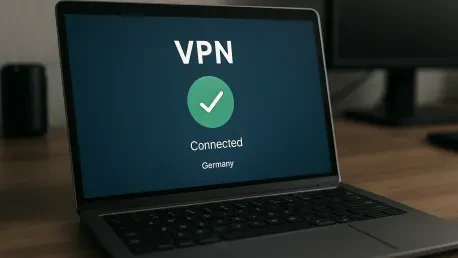In today’s rapidly evolving digital landscape, privacy and security concerns have taken center stage, especially as consumers increasingly rely on VPN apps to safeguard their online activities. Rupert Marais, an esteemed cybersecurity expert, sheds light on a recent report highlighting potential privacy threats posed by popular VPN apps linked to Chinese companies. His insights delve into the intricate dynamics of data privacy, regulatory impacts, and the responsibilities tech giants hold in protecting user information.
Can you explain the findings of the Tech Transparency Project regarding the ownership of popular VPN apps by Chinese companies?
The Tech Transparency Project revealed that many well-known VPN apps, which promise to shield user activity, are covertly owned by Chinese companies. These companies are linked through labyrinthine corporate structures, often masked by shell corporations with Western-sounding names to obfuscate their origin. This revelation is significant because it highlights a substantial vulnerability: the risk that these companies might be compelled to hand over sensitive user data to the Chinese government.
Why is the integrity of a VPN product so critical to data privacy?
VPNs play a crucial role in protecting our online privacy. Unlike other apps, a VPN routes all internet activity, meaning it potentially accesses and secures all data traffic between your devices and the web. If the integrity of a VPN is compromised, all user data, from personal communications to sensitive work documents, could be at risk. This makes the trustworthiness of a VPN provider paramount to maintaining data privacy.
How does the National Intelligence Law of 2017 affect Chinese companies in terms of user data privacy?
The National Intelligence Law of 2017 has profound implications. It mandates that Chinese companies and citizens cooperate with national intelligence efforts. This legal framework means companies can be required to share any data they collect with the government at any time, creating a challenging environment for maintaining user privacy and security, particularly for foreign users.
How could a law like the National Intelligence Law have implications for international users, particularly those in the US, using these VPN apps?
For international users, particularly in the US, the implications are troubling. If a VPN app linked to a Chinese company is subjected to this law, any data routed through the VPN can be demanded by the Chinese government. This means not just exposing communications, but possibly affecting national security if sensitive government or corporate data is accessed and shared.
What potential privacy risks are associated with VPN apps that have ties to Chinese companies?
The main risks revolve around data exposure and manipulation. These VPNs might collect browsing data, sensitive information, and even user locations, all potentially accessible to the Chinese state. This raises concerns about espionage, corporate data theft, and general privacy invasions, where user activities could be monitored or even redirected without their knowledge.
Could you elaborate on how VPN apps differ from social media apps in terms of the privacy risks they pose?
VPNs differ markedly from social media apps because they handle a broader scope of private data. While social media platforms focus on user content within their ecosystem, VPNs govern all online interactions. This includes encrypted communications and secure access to potentially confidential networks. As such, they pose an inherently greater privacy risk if compromised because all online activity, not just social media interactions, could be exposed.
What are the responsibilities of companies like Apple and Google when it comes to identifying and managing these privacy risks associated with apps on their platforms?
Apple and Google have substantial responsibilities to vet the apps they host rigorously. They should ensure that app developers meet stringent privacy standards and fully disclose their corporate affiliations. Beyond oversight, these companies need to respond proactively when researchers highlight privacy risks, ensuring that potentially hazardous apps are dealt with promptly to safeguard user data.
How has Apple responded in the past to requests from the Chinese government regarding app removals, and what does this suggest about their ability to manage app-related privacy risks?
Apple has a history of complying with Chinese government requests to remove apps, operating within the parameters set by a major manufacturing partner. This compliance suggests Apple possesses robust mechanisms to manage app threats and privacy risks. However, it raises questions about consistency and priorities, as similar actions aren’t always taken when privacy risks emerge from non-state pressures.
Why might there be a perceived double standard in how the US handles privacy threats from different types of Chinese apps?
The perceived double standard arises from the varied nature of the apps. Single-use platforms like TikTok are often scrutinized due to their high visibility and specific privacy concerns, but VPNs tend to control much broader data realms. The latter’s potential impact is more pervasive yet less visibly alarming to regulators, leading to delays in addressing broader threats posed by such apps.
Can you share your thoughts on the effectiveness of current measures or lack thereof, in holding big tech companies accountable for ensuring app safety on their platforms?
Currently, there’s a considerable gap in accountability. Without rigorous enforcement of data privacy regulations, tech companies face few repercussions for hosting harmful apps. This lack of enforceable accountability standards allows tech giants to sidestep deeper scrutiny, leading to persistent vulnerabilities. More robust legal frameworks and consistent international policies are necessary to hold these entities truly accountable.
Given the privacy risks identified, what measures do you think should be implemented to protect users on platforms like Apple’s App Store and Google Play?
To better protect users, Apple and Google should enforce stricter vetting processes, requiring transparency in app ownership and expected data handling practices. It’s essential to collaborate with global regulators to create unified security standards. Introducing mandatory privacy impact assessments for apps, particularly those linked to countries with contentious data sharing laws, would also mitigate risks significantly.









